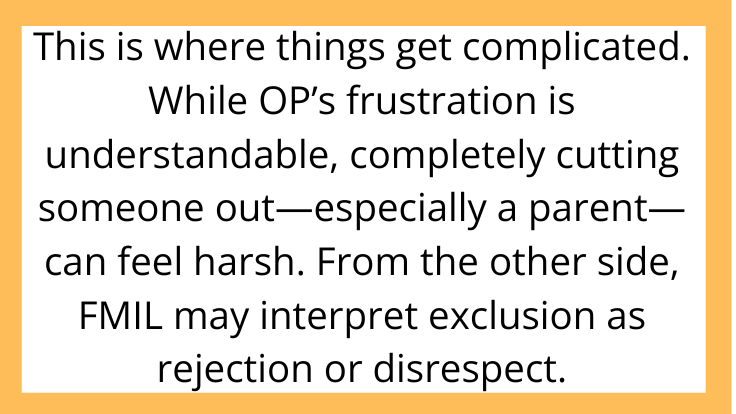AITAH for Not Wanting My Fiancé’s Mother Involved in Our Wedding Planning?
Weddings are often said to be the happiest day of your life—but planning them can be one of the most stressful. Recently, a post on r/AITAH sparked major debate after the original poster (OP) asked if they were in the wrong for wanting to keep their future mother-in-law (FMIL) out of the wedding planning process entirely.
The situation hit a nerve with many readers who’ve dealt with overbearing in-laws, boundary issues, or controlling family members. Let’s break down the scenario, analyze both perspectives, and explore how couples can set healthy boundaries without damaging family relationships.
The Background: A Wedding Becomes a Power Struggle

According to OP, they and their fiancé had just started planning their wedding when FMIL began taking over—offering unsolicited suggestions, pressuring them to book a certain venue, and even making demands about the guest list. OP tried to be polite at first, but felt steamrolled and increasingly frustrated.
Eventually, OP sat down with their fiancé and asked that FMIL not be involved in further planning discussions, suggesting they keep the wedding between the couple and a professional planner. The fiancé was torn—supportive of OP’s boundaries, but also worried about hurting his mother’s feelings.
Word got back to FMIL, and she was furious, calling OP controlling, ungrateful, and disrespectful. Family members began weighing in, and OP was left wondering: Am I the bad one here for wanting to protect our day?
Why Boundaries in Wedding Planning Are Essential

It’s natural for family—especially mothers—to feel emotionally invested in a wedding. But there’s a clear line between being supportive and being overbearing. Here’s why OP’s instinct to set boundaries might actually be a sign of wisdom, not selfishness:
-
This is your and your partner’s day. While input from loved ones can be appreciated, the final say should lie with the couple.
-
Too many cooks spoil the broth. Multiple strong opinions can quickly derail the original vision, causing tension and decision paralysis.
-
You’re building your new family. Setting boundaries now can lay the foundation for a healthy dynamic moving forward.
In many cases, resentment builds not from what’s said—but from what isn’t. By being honest early, couples can avoid deeper conflict down the line.
Is It Reasonable to Exclude a Parent from Wedding Planning?

This is where things get complicated. While OP’s frustration is understandable, completely cutting someone out—especially a parent—can feel harsh. From the other side, FMIL may interpret exclusion as rejection or disrespect.
Some alternatives to total exclusion could include:
-
Assigning limited roles: Involving her in one area (like flower arrangements or cultural traditions) while keeping control of the major decisions.
-
Setting clear expectations: Explaining what decisions are off-limits, and why, can reduce friction.
-
Mediating through the partner: Letting the fiancé handle his mother’s involvement can ease tension.
In short: you can say no without going nuclear. It’s all in how you deliver the message.
The Internet Weighs In

Commenters on the original post were split. Many supported OP, emphasizing the importance of boundaries and how invasive some in-laws can be. Others felt that completely cutting FMIL out was too extreme, and that a compromise might have avoided conflict.
One commenter summed it up well:
“You’re not wrong for wanting space—but how you manage that space matters just as much.”
When “Keeping the Peace” Backfires

A common trap in situations like this is trying to keep everyone happy. But in doing so, one party—usually the person setting boundaries—ends up sacrificing their needs.
Appeasing a difficult FMIL during wedding planning might seem like the path of least resistance, but it can come with long-term costs:
-
Building resentment in the couple
-
Setting a precedent for future boundary-breaking
-
Creating unnecessary wedding day stress
Sometimes, short-term discomfort is the price of long-term peace.
Final Thoughts: It’s Okay to Prioritize Your Happiness

Weddings should reflect the couple—not anyone else’s vision. Wanting a drama-free, low-stress planning process doesn’t make you controlling. It makes you thoughtful and self-aware.
If you’re in a similar situation:
-
Don’t ignore red flags
-
Talk openly with your partner
-
Set clear, kind, and firm boundaries early
-
Choose honesty over avoidance



